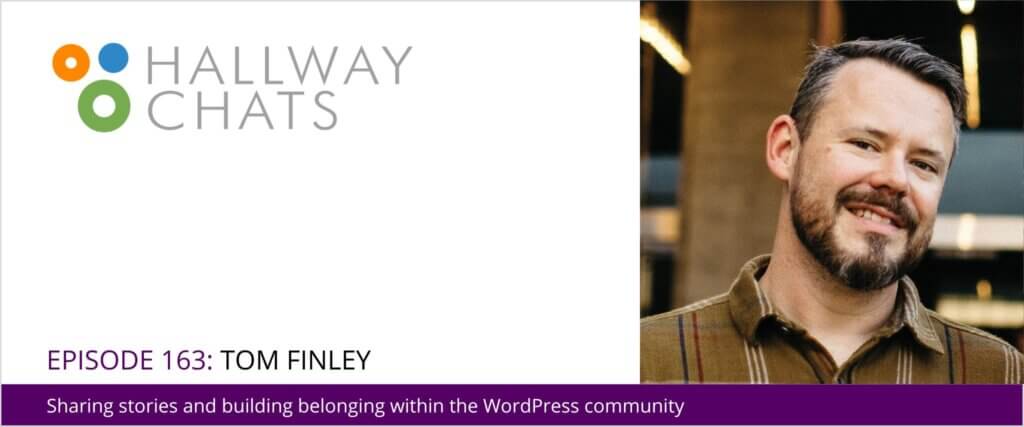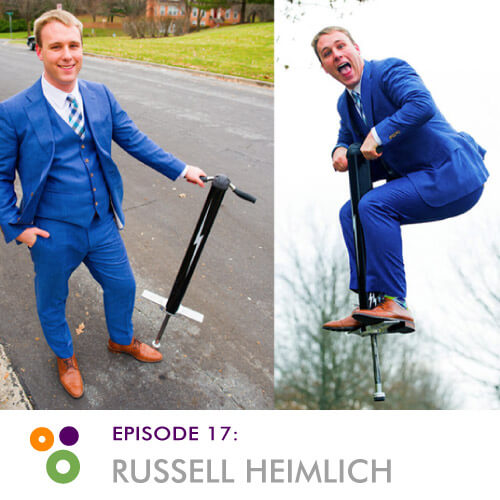Episode 163 – A Chat With Tom Finley

Podcast: Play in new window | Download
Subscribe: RSS
Show Notes
Silence Commentary, from Cassandra Decker
Tom’s Socials:
https://twitter.com/tomfinley
https://wptoots.social/@tomfinley
Websites / Projects:
https://prufcreative.com
https://tomfinley.co
https://dcbeer.com
Episode Transcript
Topher: Hey, everyone. My name is Topher.
Nyasha: And my name is Nyasha.
Topher: And this is Hallway Chats. Before we get going, we want to thank our sponsors at Nexcess, a Liquid Web brand. They have some new tools for ECommerce that really make them stand out from other options. WooCommerce automated testing, sales performance monitor, and plug-in performance monitor give you the data you need to stay powerful and profitable. And they’re free with every Nexcess plan.
Okay, our guest today is Tom Finley. Welcome.
Tom: Thanks for having me.
Topher: Thanks for being here. This is the first one of these that I’ve done that I did not know the guest. Ny was the one who brought you here. So I know basically nothing about you except you have a longboard hanging on your wall.
Tom: Yeah. Which I don’t ride anymore. Out of frame, I’ve got a couple guitars that I don’t play anymore. Why not mount them on the wall like trophies, right?
Topher: Right.
Tom: Where do I start?
Topher: Where do you live? What do you do?
Tom: I live in Washington, DC. Well, in the general area. I should be careful about how I say that because DC natives get really offended when you say you live in DC and you don’t. But I live over the river in Virginia. I’ve been here since about 2017.
Early on in the pandemic, prior to the pandemic, in fact, I worked as a marketer in in-house marketing team for telecom. I did WordPress work there but it was pretty far afield of the path that I had been pursuing prior to that, and I had just sort of hit my limit in terms of corporate culture and a lot of the stuff you tend to encounter. So my plan was after my wedding in February of 2020, and my anniversary is tomorrow, my wonderful wife-
Topher: Oh, man! What a way to kick off the pandemic!
Nyasha: Ooh. congratulations.
Tom: Yeah. So we threw the biggest party right before the pandemic. My 40th birthday was also right before the pandemic started. The idea was that I would hit the ground running as soon as my birthday was over, starting my new agency.
My niche is breweries and restaurants. So I chose sort of the exact vertical market to try to get my arms around. But, you know, so far things have been going really well. In the past year, I definitely have deepened my relationship with, I guess, what you consider the DC beer and hospitality scene. I’m really focused on sort of two communities: this local beer community and WordPress.
Within WordPress, I mean, you know, I have some limited interaction with you and Ny at MasterWP. I’m really interested in, so this makes some people bristle, but the modern WordPress trajectory, which is full site, right?
Topher: Yeah.
Tom: I guess you can consider being sort of an evangelist for a couple of things but full site is one of those.
Topher: Once Ny mentioned you, I started seeing you on Twitter all the time. And we talked about the psychological thing that makes you see things once you’ve heard about them. So you’ve been around all this time, and I just never noticed it?
Tom: I guess it depends on the season. There have been times where, you know, and I’m talking timescale of over a decade, I have definitely been more visible and active. And that tends to correspond with the job that I have. So being self-directed and really having to have a lot of skin in the WordPress game in my own agency and stake out the positioning of literally everything, I have definitely been more visible. Prior to full site, I was far more active in the Genesis corner of the WordPress community.
Topher: That would explain it. I have not been-
Tom: In fact, there was a time, I think, between 2013 and 2018, 2019, I didn’t do anything that wasn’t a Genesis site.
Topher: Gotcha. Fair enough. It worked very well for its time.
Tom: It did. It did. I have a lot of, I guess, interaction with Brian Gardner who’s now the developer advocate for WP Engine. I hope that doesn’t interfere with your sponsorships.
Topher: No, not all.
Tom: Every Friday we meet with a group. It’s an open group as long as you sign up. We have kind of, I guess, it’s an extended hallway chat for about an hour. And it’s called Build Mode. Build Mode Live to be specific. So that’s been really great to get exposure to a lot of faces and names that maybe I knew of, didn’t know really super well, getting really good insights, not only into coding and design-related challenges and developments. But also we talk about the business end of things. It’s a great little microcosm of the WordPress community. And I would invite anyone and everyone who is interested in to come check it out. If you think you don’t belong, you do belong. Doesn’t matter what level of expertise you have.
Topher: Cool.
Nyasha: Awesome. I think that’s really cool. We’ve talked before, Tom, about the work you do with the breweries in WordPress. And when you were talking it just made me think about, me and you hosting a podcast and we call it like Brews and Blocks of WordPress. I think that’s a great name.
Tom: Let’s do it. Seriously I’m ready to do it. The only barrier is time. We gotta get somebody to work on the post-production end of things because it can’t be me.
Nyasha: Got you. I have a question for you. Again, I picked your brain about it. But I know that you’re a person who is really passionate about design and user experience. What’s some advice or guidance that you would have for someone wanting to get into more UI UX, specifically in WordPress as well?
Tom: That’s an interesting question. I’ll preface it with sort of a mini-story, which is a tendency I have. Years ago, I was a teacher, I went to an AIGA Educators event. And there was a designer there by the name of Steve Heller and he gave designers like me a name. I don’t think it was very charitable or kind. But I’m a fellow designer. And it’s something that I’m okay with.
I went to school for 3D animation and computer modeling. I needed more immediate gratification than waiting at that point for, you know, Dell Pentium 700mhz processors to render out, you know, over an entire night only to find it had crashed midway.
So I went to web design because I had some sort of foundation. That’s what got me into the computer animation and modeling. I was one of the only people in that cohort who also took Web classes. I mean, there were like three other folks that I graduated with that were actually interested in web.
The best advice that I can give anybody is, practice, show up, talk to people, listen to people. There are so many great free resources that are out there now that weren’t out there in like the late 90s and early 2000s. I mean, it can be daunting without a structure. But find some of the thought leaders, if you will, in the space and try to get an idea for how they would lay things out.
And Jared Spool is one of them. There’s a guy that I only know his Twitter handle, MDS, I believe, who’s got a UI sort of certificate-style class. I mean, just avail yourself of those resources. Ask people for help. That’s probably the I think the biggest thing just in general that we don’t do well as a culture is asked for help. Just ask somebody who knows, like, “Where do I go? What do I do?” Look for the helpers.
Topher: That’s good.
Tom: And if you can’t find helpers in your industry, become one. There’s no better way to learn than by trying to figure out how to teach others. My first job out of school was actually being an instructor, which was just so ridiculous when I think back on it. But I learned a lot about software and I learned a lot about technique having to explain it to other people. That’s a really good way too.
One of the participants in Build Mode Live, in fact, is very new to WordPress. I don’t want to name names or put anybody on the spot. But you know, she’s gone over the course of like a year from really not knowing block WordPress, at least, to… I mean, now she’s doing courses and working with, I believe it’s the WordPress instruction.
Nyasha: Nice.
Tom: And like got into that by being a moderator. So there are all sorts of on-ramps. I would just say, you know, figure out how to quell your limiting beliefs. I’m one of those people. Like I try to gas folks up. You are enough. We are all eternal learners. So just internalize that mindset and you’re good. That’s probably like a lot less technical and explanation. I think that learning to enjoy learning was probably one of the most fundamental aspects of getting good at anything, right?
Topher: Yeah. That’s really good stuff.
Nyasha: Yeah, it’s awesome. I’m ready to go design now even though I can’t color in the lines quite yet. I’m like, you know, kindergarten level. But that’s okay.
Tom: Let’s do it. I mean, there are some interesting, I guess, sort of scenarios that I would love to explore. Like collaborative Figma design. I’ve heard some stories of people who really enjoyed it. In fact, one comment I saw, I believe it was on Twitter, or it might have been Mastodon, where the person who had just done this for the first time, this designer worked with a few other designers simultaneously. And they said that they had kind of like quickly become convinced that that’s how designers should be done. This like collaborative, fluid process. And I would really be open to that. And I’d really be open to sort of like a session where we talk about Figma design, and then relate that to, “Okay, I need to go over to WordPress, and figure out how to implement this.”
And there are a lot of folks right now, myself included, who have just, I don’t want to say given up, but we just moved beyond having to design everything statically. The possibilities of being able to design in browser are better than they ever had been. I think that’s the other thing is don’t get locked into one mode. Experiment.
Nyasha: Nice.
Topher: That’s good stuff.
Nyasha: I want to throw a wild card question at you. You speaking made me think about it. So I’ve been writing a lot about the AI art that’s been popping up. How do you feel about the art that’s been popping up? I know it’s been spin a lot of controversy, but I wanted to pick your brain about it.
Tom: I have thoughts. Surprisingly, anybody who does actually know me, I have a lot of thoughts on that. I mean, it’s pretty nuanced. I want to preface this by sort of like laying out my personal philosophy, which is, I genuinely want life to be good for as many people as possible. And that might be a pipe dream, but that’s usually the place that I like to show up.
The AI which isn’t… you know, it’s not artificial intelligence. It’s not. We call it that as a shorthand. But it’s all algorithms. And they are inherently flawed because they were created by inherently flawed people—humans. I really like to look at the reason behind their being. And I don’t know these companies, I don’t know these people, these developers who started these companies but intent is everything.
And if your intent is experimentation or further in the human race, then there’s a big question mark for me, because a lot of people’s written work, artwork was taken without their consent and used to teach these machines how to recognize certain patterns and produce certain answers. That’s another sort of dimension that you have to look at the or lens you have to look at this through, which is none of what the ChatGPT base stuff they’re doing it’s truth. It’s not. None of his truthful.
It’s a very similar tune, which means it’s giving the appearance of truth, but it’s not true. So I’m looking at this really murky intent and this sort of murky, maybe not intent, deceive. But people are deceived, right? They’re thinking that these things are personal search engines, that they’re actually really viable, creative tools, when in reality what you’ve done is you’ve taken the mathematical mean of our entire creative culture and what was available to the people instructing machines, you smashed it into like a tube of toothpaste and you’re squeezing out mediocrity that sometimes comes with some other artists watermark. Like quite literally it’ll spit out a bastardized version of somebody’s watermark. None of that really sits well with me. I’m sure as you can tell with the direction of this conversation.
Does that mean that I think that people who are reliant on it are bad? No. Is it all inherently bad? No. But I approach it with a lot of caution and skepticism because what it really stands to do is… I don’t think it’s going to take me out as a web designer. I don’t think it’s going to hurt anybody on this call and I don’t think that’s going to hurt anybody listening really if they are dedicated to their craft.
What I think it will do is distract and mislead people. And it also does sort of have this knock-on effect of devaluing what we do and making it more difficult to explain to people that it can’t be done in a pinch. I’ll go back to one of my own personal tropes, which is, what we do in web design development, for a lot of people is like tantamount to magic, right?
Topher: Yeah.
Tom: Tell somebody about what goes into building a website and they’re like, “Man, I can’t get my head around that. That sounds so complicated. Dude, you’re super smart.” And then that same person can turn around and quite often, in my experience, has turned around and said in a breath, like, “Hey, can you do all this? Blah, blah, blah, blah, blah. It’s totally too complicated for me. And I need you to do it for free.”
We live in this time of magical thinking where something can be so obscenely complex that it’s beyond somebody’s grasp, and yet it holds no value. And I think that there’s something about ChatGPT that plucks that string for me. Which is to say that, you know, it’s doing this magical thing, people don’t really understand it, and yet it becomes more worthless.
I think it’s dangerous for us as a culture. Because what we don’t need is more disposable, mediocre culture. We need people to really be generating their own thoughts and feelings, even if they are not good. This is a time when we’re experiencing a lot of polarization, etc. But people are telling us how to think and feel. And art is an escape from that. Art is a way of communicating. Art is a way of experiencing and sharing joy and sadness. And if you’re squeezing that out of a robotic toothpaste tube, I challenge you, how are you experiencing that?
Nyasha: Wow, that was great answer, by the way. Yes. Thank you.
Topher: It was great answer. I have a nerdy question.
Tom: Yeah.
Topher: As a 3D person, did you ever use Virtual Reality Markup Language?
Tom: I don’t think it existed back in school. And I’m really dating myself. I graduated in 2002. So it probably would have been in its infancy but it certainly wasn’t on my radar at that point.
Topher: Okay. I built one thing with it and realized it was never gonna go anywhere.
Tom: I haven’t touched 3D. I took or at least I tried to take Devon Ko’s 3D For Designers course a few years ago. I think she’d gone through some health challenges and was able to keep her learning course going and then recently shuttered it within the past year because I guess Cinema 4D kept making a lot of changes. A lot of people don’t know this, but there’s a lite version that’s bundled with Adobe After Effects. So if you have a Creative Cloud account, you technically have world-class 3D modeling software at your fingertips through After Effects. But they’re constantly changing the interface.
It’s really hard for me with 3D. It’s like a completely different world. There’s a plugin for WordPress that has 3D and I find that very intriguing.
Topher: Oh, yeah.
Tom: Have you guys seen that?
Topher: I think so.
Nyasha: I have not.
Topher: But again, I didn’t pay much attention.
Nyasha: I think WPwatercooler had someone on, the creator of the plugin. But that’s an area I’d like to see more of. I definitely think, I mean, my head and heart tells me that AR is really where we’re gonna live. I see massive beneficial implications for both websites and humanity if AR can be reasonably tastefully managed.
You don’t want it to be like Minority Report where you have all of these ads sort of jumping out at you every three feet and screaming your name. But I feel like finding your way around the physical world with some pretty well-thought-out AR would be a pretty incredible experience.
Topher: Cool. Ny, I think you had one more.
Nyasha: Yeah. Tom, this is my favorite question of the day. We, me and you usually, talk a lot about social justice, like in WordPress take, life in general. What is one or a couple of more of the more pressing issues right now that you think of when it comes to the work Press community? Or in other terms, what are some things you think we can do to make the space more equitable?
Tom: That’s actually a really good question. I am trying to pull up somebody’s name on Twitter because they had a great blog post the other day that I didn’t save or retweet. So I’m really gonna probably butcher this. I wish I could give better credit to the person who spoke these words or wrote these words.
But really what it comes down to is, in WordPress, in our culture in general, we have this tendency toward what I call performative objectivity. I think it goes back to Dr. King’s words, “Neutrality is the language of the oppressor.” Was that right?
Topher: Mm.
Nyasha: Mm-hmm.
Tom: And silence is not serving us anywhere. I have certainly staked part of, I guess, if you want to call it my personal brand. It’s me. But how I present myself is certainly that I’m not one to sit on the fence and idly watch. I would like to see more people step up.
And I get that it’s uncomfortable to take a stand, take a position, be visible. It’s not for everybody. But right now people who regard themselves as allies, people who regard themselves as believers in a sense of justice or morality can’t really afford to be silent because there is a lot of oppression happening, there’s a lot of obfuscation of the truth happening at all levels. I still see it happen within our own community, you know, just in a general lack of accountability.
You can say something inflammatory, delete it, tell people that’s not what you meant, and then reemerge days, weeks, months later as if it never happened. That’s not accountability. That is not doing the work. That is not what I would consider healthy growth.
And I’m not saying that people should be canceled. In fact, I don’t believe in canceled cultures. It doesn’t exist. It doesn’t happen. People do terrible things and come back from it, especially when they look like me and Topher. We white men get free passes like nobody’s business, right? It’s knowing that. It’s internalizing it and speaking out on it.
It’s uncomfortable but it… Like being a good web designer, like focusing on UI UX, it’s about practice, it’s about talking to people, it’s about making yourself vulnerable, and it’s about speaking up and saying, “I don’t know. Can you tell me more about this? Where am I right? Where am I wrong? How do I need to show up differently?” I just see that as a really foundational thing.
We as men and as white men really, really need to do some, I guess, sort of self-appraisal, and make sure that we are showing up for more marginalized voices.
Topher: Yeah, I agree.
Nyasha: Awesome. Awesome. Thank you, Tom. I just want to say you’re also one of the coolest people in WordPress. I appreciate you coming here today.
Tom: I appreciate that.
Nyasha: When you said yes, I was like, “Yes.”
Tom: I don’t deserve that but yeah, I appreciate that.
Nyasha: It’s okay.
Tom: I really think a lot of both of you and appreciate you having me on. I hope we get the hang out at WordCamp US 2023. It’ll be at National Harbor, Maryland.
Topher: Yeah, just near your house.
Tom: Yeah, it’s literally across the river from my house. So Korean barbecue, beer and whiskey, and WordPress. That’s my agenda.
Nyasha: I will fly there this weekend.
Tom: Come on. National airport is right by my house. Let’s go.
Topher: Ny and I are both gonna be in Bangkok in a couple of weeks. You could join us.
Tom: That is wow. That is so far.
Topher: It is.
Tom: That is so far. I would be in trouble for dropping everything and going.
Topher: It’s 24 hours of travel.
Tom: Wow. Do y’all have a plan for that?
Nyasha: I’m going to sleep.
Topher: Sort of. Yeah, a lot of movies.
Nyasha: Oh, yeah, that too.
Topher: A lot of sleep.
Tom: A lot of stretching. Stretch. I visited my cousin in Korea some years ago, actually, I’ve done it twice and it was 18-hour flight. But stretching. Stretch, stretch, stretch.
Topher: Oh, yeah. Our longest flight is 14 hours from Detroit to Seoul. That’s a long time.
Nyasha: I have only done an eight-hour New York City to LA flight. And that was what? Five years ago. So I am terrified. But I’m excited because I definitely want to go to Thailand. So I’m excited. Terrified for my long limbs but excited.
Tom: I can’t wait to see the pictures.
Topher: International flights have unlimited free alcohol. So you can sleep hard.
Tom: You have to make sure you stay hydrated because planes dehydrate you twice as much, and you won’t get good sleep.
Nyasha: And I log into the company social media by accident.
Tom: Correct. That is very important.
Nyasha: I run social media.
Tom: Can you disconnect it for the duration of the flight?
Nyasha: Yeah. I’m probably gonna delete the app.
Topher: All right, we’re gonna wrap this up. I’m gonna read the outro here.
This has been an episode of Hallway Chats, a part of the HeroPress Network. Your hosts were Nyasha Green and Topher DeRosia. We’d like to thank Sofia DeRosia for the music and Nexcess for hosting our network. If you liked the episode, please subscribe and mention us on social media. And thanks Tom for being here.
Tom: Thank you, Topher.
Nyasha: Thank you, Tom.
Tom: Thank you, Ny.
Nyasha: You’re the best.
Tom: You too.





